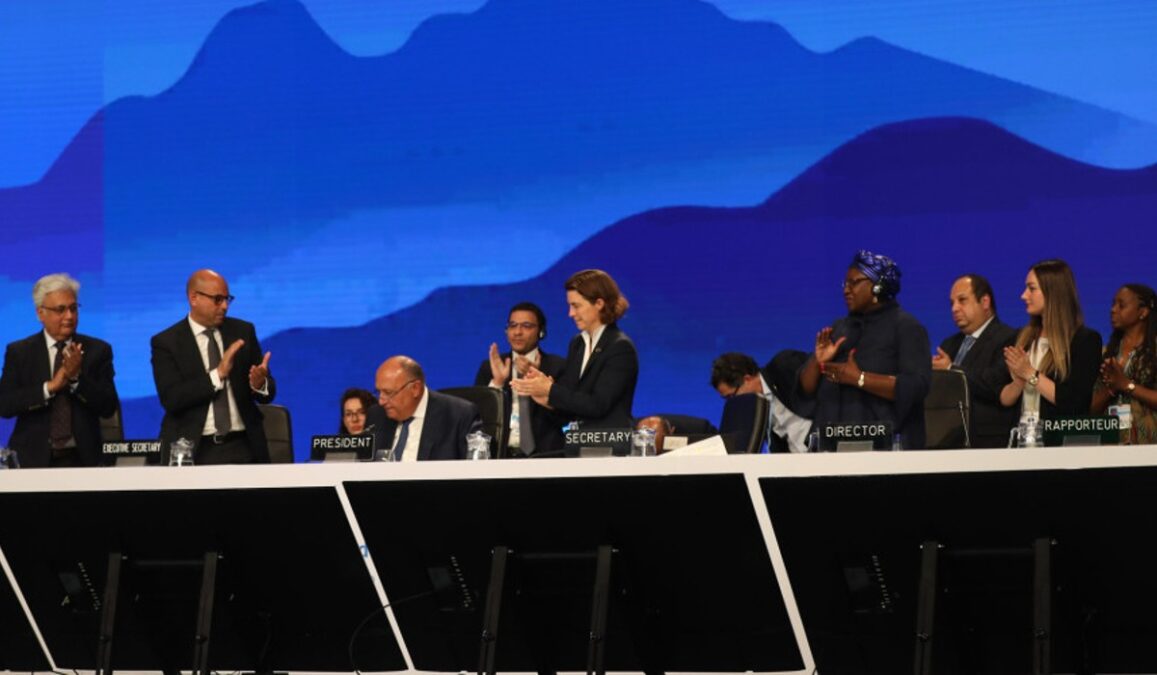COP27, the United Nations Climate Change Conference, wrapped up in Egypt on Sunday after a breakthrough agreement was reached by participants to provide “loss and damage” funding for vulnerable countries hit hard by climate disasters.
“This outcome moves us forward,” said Simon Stiell, UN Climate Change Executive Secretary. “We have determined a way forward on a decades-long conversation on funding for loss and damage – deliberating over how we address the impacts on communities whose lives and livelihoods have been ruined by the very worst impacts of climate change.”
Sameh Shoukry, the Egyptian foreign minister and president of Cop27 said: “We rose to the occasion. We worked around the clock, day and night, but united in working for one gain, one higher purpose, one common goal. In the end we delivered. We listened to the calls of anguish and despair.”
Following tense negotiations that ran through the night, the summit’s Egyptian presidency released a draft text of the overall agreement early on Sunday and also called a plenary session to push the document through as the final, overarching agreement for the UN summit.
The UN said in a statement that governments took the ground-breaking decision to establish new funding arrangements, as well as a dedicated fund, to assist developing countries in responding to loss and damage.
“Governments also agreed to establish a ‘transitional committee’ to make recommendations on how to operationalize both the new funding arrangements and the fund at COP28 next year. The first meeting of the transitional committee is expected to take place before the end of March 2023,” the statement read.
Sherry Rehman, climate change minister of Pakistan, hailed the “historic” loss and damage deal to applause in the conference hall.
“This is not about accepting charity,” she said. “This is a down payment on investment in our futures, and in climate justice.” This comes after Pakistan suffered devastating floods two months ago that caused major losses to the country.
The adoption of the fund is also a big win for other, poorer nations, which have long called for financial compensation because they are often the victims of climate change, including worsened floods, droughts, heat waves, famines and storms. This, despite these countries having contributed little to the pollution that is heating up the planet.
Collins Nzovu, Zambia’s minister of green economy and environment, said the agreement was “very exciting because for us, success in Egypt was going to be based on what we get from loss and damage.”
“This positive outcome from COP27 is an important step toward rebuilding trust with vulnerable countries,” he said.
According to the agreement, the fund would initially draw on contributions from developed countries and other private and public sources such as international financial institutions.
While major economies such as China would not initially be required to contribute, that option will be negotiated over the coming years.
Both the European Union and the United States have argued that China and other large polluters currently classified as developing countries have the financial clout and responsibility to pay their share.
Some delegates meanwhile said the approved deal does not do enough to boost efforts to tackle the emissions that cause global warming.
It did not contain a reference requested by India and some other delegations to the phasing down use of “all fossil fuels”.
It instead called on countries to take steps toward “the phasedown of unabated coal power and phase-out of inefficient fossil fuel subsidies,” as agreed at the COP26 Glasgow summit.
COP27 brought together more than 45,000 participants to share ideas, solutions, and build partnerships and coalitions. Indigenous peoples, local communities, cities and civil society, including youth and children, showcased how they are addressing climate change and shared how it impacts their lives.
Wrapping up the summit, COP27 President Sameh Shoukry said: “The work that we’ve managed to do here in the past two weeks, and the results we have together achieved, are a testament to our collective will, as a community of nations, to voice a clear message that rings loudly today, here in this room and around the world: that multilateral diplomacy still works…. despite the difficulties and challenges of our times, the divergence of views, level of ambition or apprehension, we remain committed to the fight against climate change…. we rose to the occasion, upheld our responsibilities and undertook the important decisive political decisions that millions around the world expect from us.”





